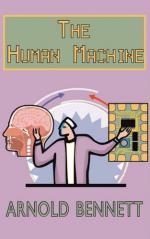Considering that we have to spend the whole of our lives in this human machine, considering that it is our sole means of contact and compromise with the rest of the world, we really do devote to it very little attention. When I say ‘we,’ I mean our inmost spirits, the instinctive part, the mystery within that exists. And when I say ‘the human machine’ I mean the brain and the body—and chiefly the brain. The expression of the soul by means of the brain and body is what we call the art of ‘living.’ We certainly do not learn this art at school to any appreciable extent. At school we are taught that it is necessary to fling our arms and legs to and fro for so many hours per diem. We are also shown, practically, that our brains are capable of performing certain useful tricks, and that if we do not compel our brains to perform those tricks we shall suffer. Thus one day we run home and proclaim to our delighted parents that eleven twelves are 132. A feat of the brain! So it goes on until our parents begin to look up to us because we can chatter of cosines or sketch the foreign policy of Louis XIV. Good! But not a word about the principles of the art of living yet! Only a few detached rules from our parents, to be blindly followed when particular crises supervene. And, indeed, it would be absurd to talk to a schoolboy about the expression of his soul. He would probably mutter a monosyllable which is not ‘mice.’
Of course, school is merely a preparation for living; unless one goes to a university, in which case it is a preparation for university. One is supposed to turn one’s attention to living when these preliminaries are over—say at the age of about twenty. Assuredly one lives then; there is, however, nothing new in that, for one has been living all the time, in a fashion; all the time one has been using the machine without understanding it. But does one, school and college being over, enter upon a study of the machine? Not a bit. The question then becomes, not how to live, but how to obtain and retain a position in which one will be able to live; how to get minute portions of dead animals and plants which one can swallow, in order not to die of hunger; how to acquire and constantly renew a stock of other portions of dead animals and plants in which one can envelop oneself in order not to die of cold; how to procure the exclusive right of entry into certain huts where one may sleep and eat without being rained upon by the clouds of heaven. And so forth. And when one has realised this ambition, there comes the desire to be able to double the operation and do it, not for oneself alone, but for oneself and another. Marriage! But no scientific sustained attention is yet given to the real business of living, of smooth intercourse, of self-expression, of conscious adaptation to environment—in brief, to the study of the machine. At thirty the chances are that a man will understand better the draught of a chimney than his own respiratory




